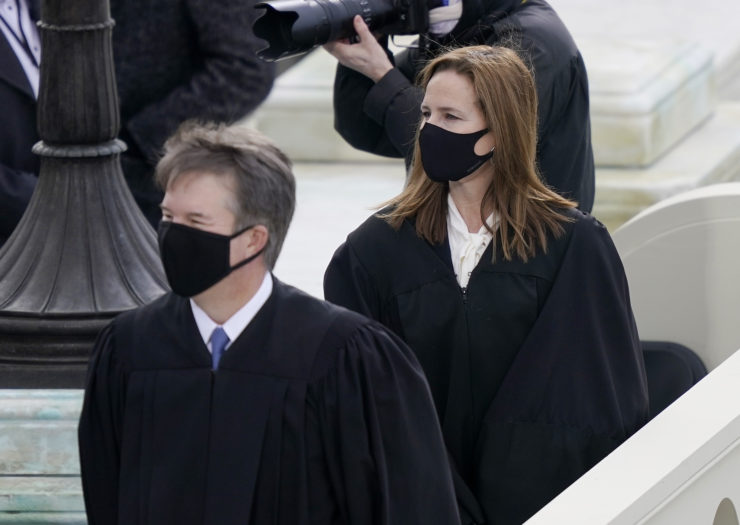Will the Supreme Court allow Fugitive Uterus Acts to be enforced?

It was inevitable that some neoconfederate jurisdictions would try to prevent women from traveling to states who reject the gender relations of 19th century common law to obtain abortions:
More than a year after Roe v. Wade was overturned, many conservatives have grown frustrated by the number of people able to circumvent antiabortion laws — with some advocates grasping for even stricter measures they hope will fully eradicate abortion nationwide.
That frustration is driving a new strategy in heavily conservative cities and counties across Texas. Designed by the architects of the state’s “heartbeat” ban that took effect months before Roe fell, ordinances like the one proposed in Llano — where some 80 percent of voters in the county backed President Donald Trump in 2020 — make it illegal to transport anyone to get an abortion on roads within the city or county limits. The laws allow any private citizen to sue a person or organization they suspect of violating the ordinance.
Antiabortion advocates behind the measure are targeting regions along interstates and in areas with airports, with the goal of blocking off the main arteries out of Texas and keeping pregnant women hemmed within the confines of their antiabortion state. These provisions have already passed in two counties and two cities, creating legal risk for those traveling on major highways including Interstate 20 and Route 84, which head toward New Mexico, where abortion remains legal and new clinics have opened to accommodate Texas women. Several more jurisdictions are expected to vote on the measure in the coming weeks.
In his infamous “are we the baddies?” concurrence in Dobbs, Kavanaugh tried to pre-empt the possibility:
…as I see it, some of the other abortion-related legal questions raised by today’s decision are not especially difficult as a constitutional matter. For example, may a State bar a resident of that State from traveling to another State to obtain an abortion? In my view, the answer is no based on the constitutional right to interstate travel.
Since Kavanaugh is the median vote on this issue and the law is black-letter, state or local attempts to interfere with interstate travel to obtain an abortion will be prevented from going into effect and then ruled unconstitutional, right? Well, not necessarily:
The Court’s decision in Whole Woman’s Health v. Jackson looms over this discussion of travel bans like a plague. Dickson’s model legislation was clearly written with Jackson in mind, as it relies on the sort of private bounty hunters that the Court embraced in Jackson.
As a general rule, someone who fears that their rights will be curtailed by an unconstitutional state or local law may obtain a federal court order blocking that law. The Supreme Court held in Ex parte Young (1908) that someone seeking such a court order must sue the specific state official who is tasked with enforcing the unconstitutional law. So, for example, if Texas passed a law ordering the state police to blockade I-20 to prevent anyone from traveling on it to obtain an abortion, a plaintiff who wished to block this law might sue the head of the state’s police force.
SB 8, the law the Court embraced in Jackson, tried to immunize itself from judicial review by stating that no state official may attempt to enforce it — only private bounty hunters filing lawsuits could do so. And, in a 5-4 decision, the Supreme Court agreed that this bounty hunter framework immunized the law from federal lawsuits seeking to block it.
In fairness, someone who is sued under SB 8 could still allege at their trial that the law is unconstitutional. But SB 8 permits virtually anyone to sue any abortion provider who performs an abortion after the sixth week of pregnancy. So anyone accused of violating the law risked being bombarded with so many lawsuits that their legal fees would bankrupt them.
That’s why it was so important to block the law before anyone was sued under it, and why the Supreme Court’s decision to immunize SB 8 from federal review was such a harsh blow to abortion rights in Texas.
Meanwhile, Dickson’s model legislation uses a similar mechanism to evade judicial review. Under that legislation, the ban on traveling through the wrong Texas county to help someone obtain an abortion “shall be enforced exclusively through … private civil actions.”
As a practical matter, it’s unclear if this framework will actually be effective in deterring people from traveling to New Mexico to seek abortions. If a man drives his pregnant girlfriend through Mitchell County on the way to an abortion clinic in New Mexico, how is anyone other than the two of them supposed to know where they are headed?
But the law could wind up deterring women in abusive relationships, or other patients whose acquaintances or family members learn that they are seeking an abortion. Indeed, according to the Washington Post, Dickson suggested that “a husband who doesn’t want his wife to get an abortion could threaten to sue the friend who offers to drive her.”
If that lawsuit happens, the wife’s friend should prevail — he can argue at trial that the Mitchell County ordinance violates the constitutional right to travel. But even if this friend does prevail, they will wind up having to hire legal counsel and endure the stress of a lawsuit that never should have been filed in the first place.
The possibility that a majority of the Court will pretend to be “flummoxed” by a very obvious attempt at the nullification of a constitutional right that very obviously involves state action and allow lawsuits against people helping women obtaining abortions across state lines is all too real. It worked to get Roe v. Wade effectively overruled by an unreasoned opinion at midnight, after all.


